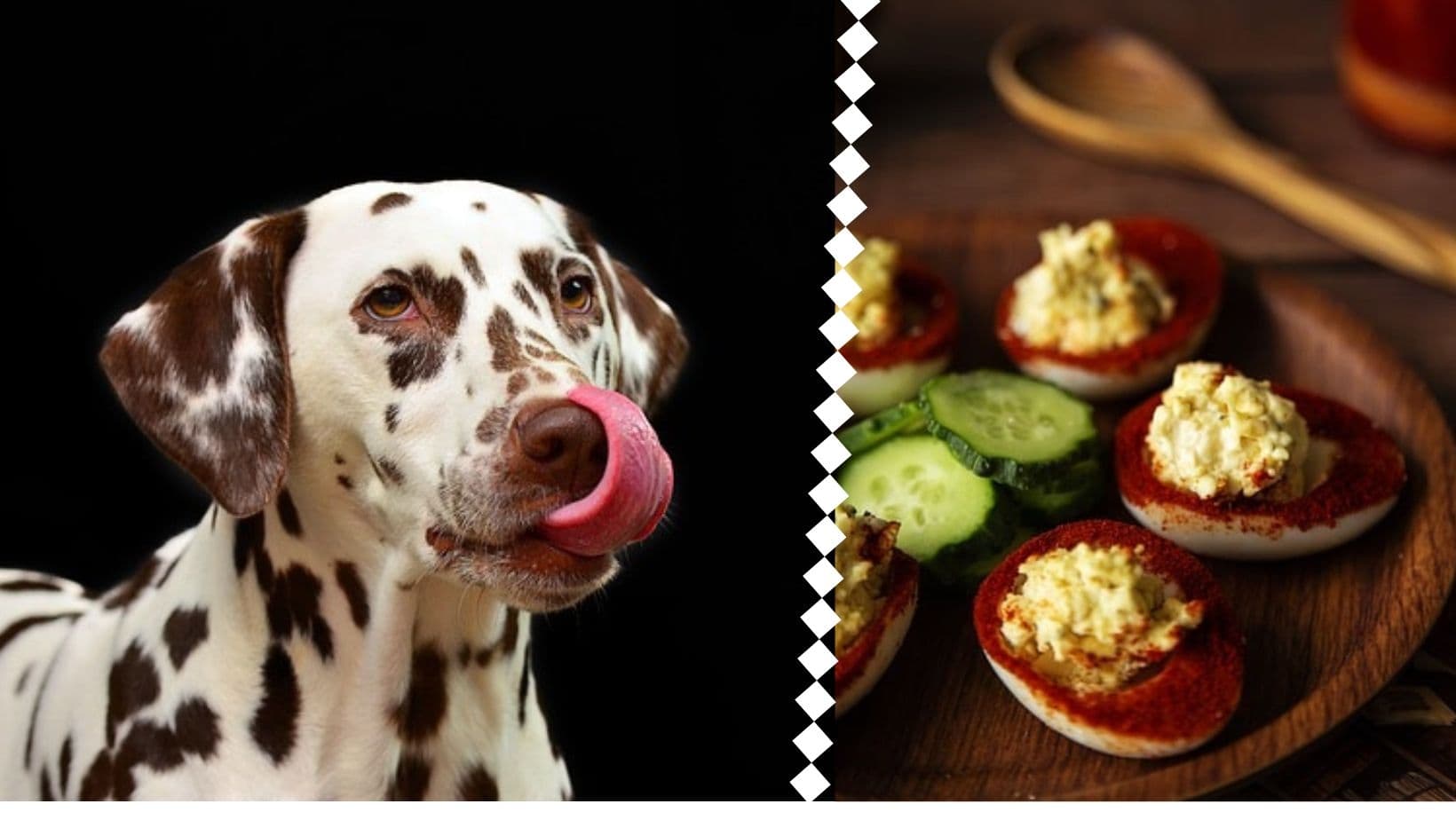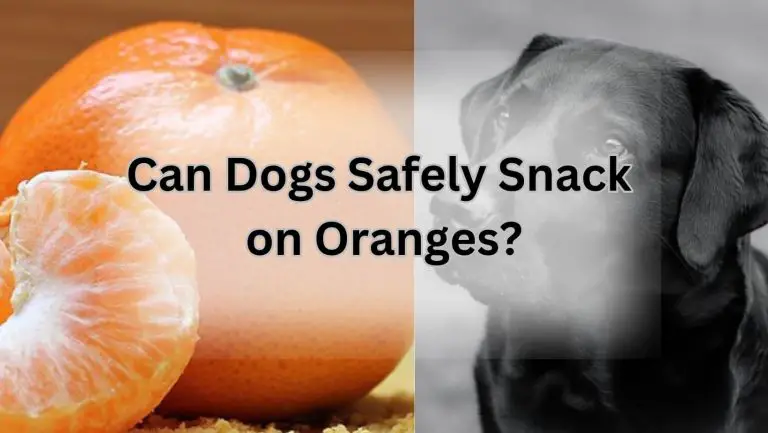Unraveling the Truth: Are Deviled Eggs Safe for Dogs?

Are Deviled Eggs Safe for Dogs?
Deviled eggs are a popular appetizer enjoyed by many humans, but what about our furry friends? Can dogs safely indulge in this delectable dish? It’s important to understand the potential risks and implications before sharing deviled eggs with your canine companion.
When it comes to the safety of deviled eggs for dogs, the answer is not as straightforward as we might hope. While plain, hard-boiled eggs are generally safe and even beneficial for dogs in moderation, the devilish twist of deviled eggs introduces additional ingredients that can be harmful to our four-legged friends.
The nutritional needs of dogs differ from those of humans, and certain ingredients commonly found in deviled eggs can pose a risk to their health. For example, many deviled egg recipes contain ingredients such as mayonnaise, onions, garlic, and spices, which can be toxic to dogs.
Mayonnaise, a common base for the filling of deviled eggs, often contains high levels of fat and can cause digestive upset or pancreatitis in dogs if consumed in large quantities. Onions and garlic, popular flavor enhancers, contain compounds that can damage a dog’s red blood cells, leading to anemia. Additionally, some spices, such as paprika, can cause stomach irritation and discomfort.
If a dog ingests deviled eggs containing these harmful ingredients, they may experience symptoms such as vomiting, diarrhea, abdominal pain, lethargy, and even anemia. It’s essential to be vigilant and recognize the signs of potential toxicity in dogs.
So, what can you do if you want to treat your dog to a special snack without the risks associated with deviled eggs? There are plenty of dog-friendly alternatives that you can consider. For example, you can offer your dog plain, cooked eggs as a nutritious and safe treat. Alternatively, you can prepare specialized dog treats using dog-friendly ingredients like carrots, sweet potatoes, or lean meats.
When it comes to feeding deviled eggs or any new food to your dog, it’s always wise to consult with your veterinarian first. They can provide guidance based on your dog’s unique dietary needs and help you make informed decisions about their diet.
While it may be tempting to share your favorite appetizer with your furry friend, it’s crucial to prioritize their safety and well-being. Proceeding with caution and opting for dog-friendly alternatives will ensure that your dog can enjoy snack time without any adverse effects.
II. Understanding the Nutritional Needs of Dogs
Before we dive into the topic of deviled eggs and dogs, it’s crucial to have a clear understanding of your furry friend’s nutritional needs. Dogs have different dietary requirements compared to humans, and their digestive systems are not designed to process all types of foods in the same way.
Dogs are primarily carnivorous animals, meaning they thrive on a diet that consists mainly of meat. Their bodies are adapted to efficiently absorb and utilize nutrients from animal-based protein sources.
Protein is an essential component of a dog’s diet, and it helps support muscle growth, repair tissues, and maintain a healthy coat. Other vital nutrients for dogs include fats, carbohydrates, vitamins, and minerals. Each nutrient plays a specific role in promoting overall health and well-being.
It’s important to note that while dogs can digest certain plant-based foods, their bodies have limited ability to break down complex carbohydrates found in some fruits, vegetables, and grains. This is why a balanced diet for dogs usually consists primarily of animal protein.
Feeding dogs a well-balanced diet that meets their nutritional needs is crucial for their longevity and overall health. It’s always best to consult with a veterinarian to determine the most appropriate diet for your specific dog, taking into account factors such as breed, age, weight, and any underlying health conditions.
III. The Dangers of Feeding Deviled Eggs to Dogs
While deviled eggs may be a popular and tasty treat for humans, they can pose several dangers to dogs. It’s important to understand these risks before considering sharing this snack with your canine companion.
One of the main concerns with feeding deviled eggs to dogs is the potential for ingredient toxicity. Deviled eggs often contain ingredients that are harmful or even toxic to dogs, such as onion and garlic. Both onion and garlic belong to the Allium genus and contain compounds that can cause damage to a dog’s red blood cells, leading to anemia. Ingesting even small amounts of these ingredients can be dangerous for dogs.
Another common ingredient in deviled eggs is mayonnaise, which can be high in fat and potentially lead to pancreatitis in dogs. Pancreatitis is a condition characterized by inflammation of the pancreas and can cause severe abdominal pain, vomiting, and diarrhea in canines.
Additionally, the seasoning and spices used in deviled eggs, such as paprika, cayenne pepper, or hot sauce, can irritate a dog’s digestive system and potentially cause gastrointestinal upset. Dogs have a more sensitive palate compared to humans, and these spicy ingredients may be overwhelming and even harmful to their delicate digestive systems.
Moreover, the high salt content in deviled eggs can be detrimental to a dog’s health. Dogs require a balanced diet with controlled sodium intake, and excessive salt can lead to dehydration, electrolyte imbalances, and even kidney problems.
It’s important to note that every dog is different, and some may tolerate small amounts of deviled eggs better than others. However, it’s always best to err on the side of caution and prioritize your dog’s health and well-being.
IV. Common Ingredients in Deviled Eggs that Can Harm Dogs
When it comes to dogs, certain ingredients commonly found in deviled eggs can be harmful to their health. It’s important to understand these ingredients and their potential risks before considering feeding deviled eggs to your furry friend.
1. Onion and Garlic: These ingredients are often present in the filling of deviled eggs, either in the form of fresh onions or garlic powder. Both onion and garlic contain compounds that can damage a dog’s red blood cells, leading to a condition called hemolytic anemia. This condition can cause symptoms like weakness, lethargy, pale gums, and even collapse.
2. Mayonnaise: Deviled eggs are typically made with mayonnaise, which can be high in fat and calories. Feeding your dog large amounts of mayonnaise can lead to weight gain and other associated health issues like pancreatitis. Additionally, some mayonnaise brands may contain ingredients like onion powder or garlic powder, which can be toxic to dogs.
3. Mustard: Another ingredient commonly used in deviled eggs is mustard. While small amounts of mustard are typically not harmful to dogs, prolonged or excessive consumption can lead to stomach upset, diarrhea, or other gastrointestinal issues.
4. Paprika: Paprika is often used as a garnish on deviled eggs for added flavor and visual appeal. However, some dogs may be sensitive or allergic to paprika, resulting in digestive upset, skin irritation, or other allergic reactions.
5. Salt and Seasonings: Deviled eggs often contain salt and various seasonings to enhance their taste. While a small amount of salt is generally safe for dogs, excessive sodium intake can lead to dehydration, electrolyte imbalances, and other health problems. Additionally, certain seasonings like cayenne pepper or chili powder can cause gastrointestinal upset or irritation.
It’s important to note that even if a particular deviled egg recipe does not contain these harmful ingredients, it’s still best to err on the side of caution and avoid feeding deviled eggs to your dog altogether. There are plenty of dog-friendly alternatives and snacks available that can satisfy your dog’s cravings without posing any risks to their health. Remember, always consult with your veterinarian before making any major changes to your dog’s diet.
Signs of Toxicity in Dogs from Eating Deviled Eggs
While deviled eggs may be a delicious treat for humans, they can pose serious risks to dogs if consumed. It’s important to know the signs of toxicity in dogs that result from eating deviled eggs. These signs can vary depending on the specific ingredients used in the recipe, but some common symptoms include:
1. Upset Stomach and Digestive Issues
Dogs have sensitive stomachs, and the rich and fatty nature of deviled eggs can lead to gastrointestinal upset. If your dog starts vomiting or experiencing diarrhea after eating deviled eggs, it may be a sign of toxicity.
2. Pancreatitis
Deviled eggs are often made with ingredients high in fat, such as mayonnaise, bacon, or cheese. Excessive fat intake can lead to pancreatitis in dogs, a painful and potentially life-threatening condition. Symptoms of pancreatitis include abdominal pain, loss of appetite, vomiting, and lethargy.
3. Allergic Reactions
Some dogs may be allergic to ingredients commonly found in deviled eggs, such as onions or garlic. Allergic reactions can manifest as itching, redness, swelling, hives, or even difficulty breathing. It’s crucial to seek immediate veterinary attention if your dog shows signs of an allergic reaction.
4. Salt Toxicity
Deviled eggs often contain salt, which can be harmful to dogs when consumed in high amounts. Excessive salt intake can lead to dehydration, electrolyte imbalances, and even salt poisoning. Symptoms of salt toxicity in dogs include excessive thirst, lethargy, tremors, seizures, and in severe cases, even death.
5. Choking Hazard
Deviled eggs may contain small pieces of ingredients like bacon, cheese, or herbs that can present a choking hazard for dogs. This is especially true for small dog breeds or dogs prone to gulping their food without chewing it properly. Choking can be life-threatening and requires immediate intervention.
It is important to remember that dogs have different digestive systems and nutritional needs than humans. What may be a harmless treat for us can be dangerous for our furry friends. If you suspect that your dog has consumed deviled eggs or any other potentially toxic food, it’s crucial to contact your veterinarian for guidance and assistance.
VI. Alternatives to Deviled Eggs for Dogs
While it’s generally best to avoid feeding deviled eggs to dogs due to the potential risks, there are plenty of other delicious options you can offer your furry friend on special occasions. Here are some alternative treats that are safe and healthy for dogs:
1. Plain Hard-Boiled Eggs:
If you want your dog to enjoy the benefits of eggs without the added ingredients found in deviled eggs, plain hard-boiled eggs are a great option. They are packed with protein and essential nutrients.
2. Cooked Chicken or Turkey:
Lean, boneless, and skinless chicken or turkey can be a tasty and nutritious treat for your dog. Just make sure it is thoroughly cooked and doesn’t contain any seasonings or added ingredients that could be harmful to dogs.
3. Fresh Fruits and Vegetables:
Many fruits and veggies are safe for dogs and can make for a healthy and refreshing treat. Examples include sliced apples, blueberries, carrots, and cucumbers. Just be sure to remove any seeds, pits, or parts that could pose a choking hazard.
4. Dog-Specific Treats:
There are plenty of dog-friendly treats available in pet stores and online. Look for options that are made specifically for dogs, with ingredients that are safe and beneficial for their health.
5. Homemade Healthy Treats:
If you enjoy cooking, you can make your own dog-friendly snacks using dog-friendly recipes. There are many resources available online with recipes that use safe and nutritious ingredients for dogs.
Remember, moderation is key when offering treats to your dog. Treats should only make up a small portion of their overall diet to ensure they are getting the balanced nutrition they need.
Heading VII: Best Dog-Safe Snack Options for Special Occasions
When it comes to special occasions or gatherings, it’s natural to want to include your beloved furry friend in the festivities. However, it’s essential to choose dog-friendly snacks that are safe and won’t pose any health risks. While deviled eggs may not be a suitable choice for dogs, there are plenty of other delicious and healthy options that you can offer your canine companion.
1. Cooked and Chilled Meat
One excellent alternative to deviled eggs is cooked and chilled meat. Lean options such as chicken, turkey, or beef can make a tasty treat for your dog. Make sure to remove any bones, skin, or seasoning before offering it to them. Cut the meat into small, bite-sized pieces to prevent any choking hazards.
2. Fresh Fruits and Vegetables
Fruits and vegetables are not only delicious but also packed with essential vitamins and minerals. Some dog-safe options include apples, bananas, carrots, and green beans. Before serving, ensure that you remove any seeds, pits, or skins that may be harmful to your furry friend.
3. Natural Peanut Butter
Another dog-friendly snack that can add some excitement to special occasions is natural peanut butter. It is a good source of healthy fats and protein. You can spread a small amount on a slice of apple or offer it as a lickable treat. Just make sure to choose peanut butter that doesn’t contain xylitol, a sweetener that is toxic to dogs.
4. Frozen Yogurt Treats
If you’re looking for a cold and refreshing snack, consider making frozen yogurt treats for your four-legged friend. Use plain, unsweetened yogurt as a base and mix in some dog-friendly fruits like blueberries or strawberries. Pour the mixture into ice cube trays or silicone molds and freeze until solid. Your dog will love licking these icy treats!
5. Homemade Dog Treats
If you enjoy baking, why not whip up some homemade dog treats? There are countless recipes available online that use dog-safe ingredients such as pumpkin, oats, and peanut butter. By making your own treats, you have full control over the ingredients and can cater to any dietary sensitivities your dog may have.
Remember, moderation is key when offering these special snacks to your dog. Treats should only make up a small portion of their overall diet, and it’s important to consider their specific nutritional needs. Always consult with your veterinarian if you have any concerns or questions regarding your dog’s diet or any potential health risks associated with specific foods.
How to Prevent Dogs from Accessing Deviled Eggs
When it comes to deviled eggs, it’s crucial to take precautions to prevent your furry friend from accessing them. Dogs are known for their curious nature and their ability to get into things they shouldn’t. Here are some tips to help you keep your deviled eggs out of your dog’s reach:
1. Secure the food
Make sure that any deviled eggs or other tempting foods are securely stored and out of your dog’s reach. Keep them on high countertops or inside closed cabinets. Avoid leaving them unattended on the dining table or kitchen island, as dogs can easily jump up and help themselves.
2. Use pet gates
If you’re hosting a gathering or cooking in the kitchen, consider using pet gates to keep your dog out of the areas where food is being prepared or served. This will help minimize the risk of your dog sneaking a taste when you’re not looking.
3. Train your dog
Teach your dog basic obedience commands, such as “leave it” or “stay,” to prevent them from getting too close to the table or countertops where the deviled eggs are. Consistent training and positive reinforcement can go a long way in keeping your dog away from tempting food items.
4. Keep trash securely covered
Dispose of any leftover deviled eggs and their packaging in a trash can with a tight-fitting lid. Dogs are opportunistic eaters and may be tempted to root through the trash in search of tasty scraps. By keeping the trash securely covered, you can minimize the chances of your dog getting hold of any potentially harmful foods.
5. Offer dog-friendly alternatives
If you’re celebrating a special occasion and want to include your dog in the festivities, consider preparing dog-friendly deviled eggs using safe ingredients such as boiled, plain eggs mashed with a small amount of plain yogurt or pureed pumpkin. This way, your dog can enjoy a similar treat without the unhealthy additives or ingredients.
By implementing these preventive measures, you can ensure your dog’s safety and prevent any potential harm that may arise from them consuming deviled eggs or other human foods that are unsafe for them. Remember, it’s always better to be proactive when it comes to your dog’s well-being and nutrition.
IX. Consulting with a Veterinarian About Your Dog’s Diet
When it comes to the well-being of your furry friend, it’s always a good idea to consult with a veterinarian about their diet. Whether you are considering feeding your dog deviled eggs or any other human food, seeking professional advice is crucial. Veterinarians have extensive knowledge and experience in animal nutrition, which can help ensure that your dog receives a balanced and healthy diet.
During a consultation with your veterinarian, you can discuss the specific dietary needs of your dog. Every dog is unique, with factors such as age, weight, breed, and overall health playing a role in determining the appropriate diet. Your veterinarian will be able to recommend the best food options for your dog, taking into account any existing allergies or sensitivities.
Furthermore, veterinarians can advise you on the potential risks and benefits of certain human foods for dogs. They will be able to provide accurate information about whether deviled eggs are safe for your furry friend to consume. Additionally, they can give you alternatives and suggest suitable snacks that will satisfy your dog’s cravings without compromising their health.
Remember that while deviled eggs may be a delicious treat for humans, they may not be suitable for dogs due to various reasons, including ingredients that can be toxic to them. Your veterinarian will be able to explain these risks in detail and help you make informed decisions when it comes to your dog’s diet.
By consulting with a veterinarian, you can provide the best care for your dog and ensure that their nutritional needs are met. Your veterinarian will guide you in creating a well-balanced diet for your dog, taking into account their specific requirements and any potential risks associated with certain foods. So, if you have any doubts or questions about incorporating deviled eggs or other human foods into your dog’s diet, reach out to your vet for professional advice and peace of mind.
X. Bottom Line: Proceed with Caution When Feeding Deviled Eggs to Dogs
While dogs can safely eat plain hard-boiled eggs in moderation, deviled eggs should be approached with caution. Deviled eggs are not recommended for dogs due to potential health risks associated with certain ingredients commonly used in their preparation.
Deviled eggs are typically made with mayonnaise, mustard, salt, and various seasonings. Dogs have different nutritional needs than humans, and some of the ingredients found in deviled eggs can be harmful to dogs.
The Dangers of Feeding Deviled Eggs to Dogs
Mayo, a key ingredient in deviled eggs, is high in fat and can lead to pancreatitis in dogs. Pancreatitis is a serious condition that causes inflammation of the pancreas and can result in vomiting, diarrhea, and abdominal pain. Additionally, the high sodium content in deviled eggs can be detrimental to a dog’s health, potentially leading to dehydration and kidney problems.
Mustard is another common ingredient in deviled eggs, but it can cause gastrointestinal upset in dogs, including stomach pain and diarrhea. Dogs have more sensitive digestive systems compared to humans, and certain spices and seasonings used in deviled eggs may irritate their gastrointestinal tract.
Signs of Toxicity in Dogs from Eating Deviled Eggs
If your dog manages to sneak a bite of deviled eggs, it’s essential to be vigilant for any signs of toxicity. Symptoms may include vomiting, diarrhea, lethargy, loss of appetite, and in severe cases, seizures. If you notice any of these signs, it’s crucial to seek immediate veterinary attention.
Alternatives to Deviled Eggs for Dogs
Instead of sharing deviled eggs with your furry friend, consider offering them dog-friendly alternatives. Plain hard-boiled eggs are a safe and nutritious option for dogs, as long as they are served plain, without any added spices or seasonings. You can also provide your pup with small portions of cooked lean meats like chicken or turkey, as these can be tasty and safe treats.
Best Dog-Safe Snack Options for Special Occasions
If you want to include your dog in special occasions, there are plenty of dog-safe snacks available on the market. Look for treats specifically formulated for dogs, made with high-quality ingredients and free from harmful additives. There are even dog-friendly “deviled egg” recipes available that substitute canine-friendly ingredients for the harmful ones found in traditional deviled eggs.
How to Prevent Dogs from Accessing Deviled Eggs
It’s important to keep deviled eggs and other potentially harmful foods out of your dog’s reach. These delicious treats can be tempting for canines, and it’s essential to ensure they cannot access them. Keep food stored securely in sealed containers or in the refrigerator, and be mindful of any countertops or tables where deviled eggs may be within your dog’s reach.
Consulting with a Veterinarian About Your Dog’s Diet
If you have concerns about what foods are safe for your dog to consume, it’s always best to consult with a veterinarian. They can provide professional guidance tailored to your dog’s specific dietary needs and help you make informed decisions about what to feed your furry friend.
In conclusion, while it is generally safe for dogs to eat plain hard-boiled eggs, deviled eggs should be avoided due to potential health risks associated with their ingredients. Always prioritize your dog’s well-being and consult with a veterinarian if you have any doubts or questions about their dietary needs.






